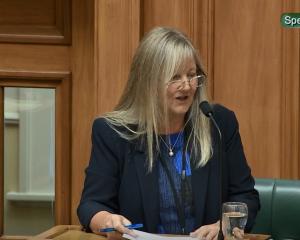The Green Party's warrant of fitness scheme for rental houses will discourage unprofessional landlords from being in the market, Green Party co-leader Metiria Turei says.
''People who don't want to be professional landlords and maintain a professional standard will get out of the rental business.
''That is not a bad thing.''
Labour also promised a warrant of fitness scheme, but it was ''a lot softer'', Ms Turei said.
In a coalition arrangement, the Greens would work with Labour on a stronger policy to protect renters.
''We aren't afraid of making the changes that's going to improve the situation for a million renters.''
Home ownership rates had declined, which made protection for renters more important.
At present, the law did not require landlords to provide a working toilet, or hot and cold running water.
Asked if houses were too expensive, she said they were, both for purchase and rentals.
''Everywhere in the country ... that's the problem. It's why we have such a high rate of rental.''
Ms Turei said the Green Party wanted houses to be more affordable, and was confident it could do so without harming people's equity.
She said 35% of New Zealanders rented, compared with 25% in 1990.
The warrant of fitness would be voluntary for the first two years, and become compulsory in 2017.
Houses would have to meet minimum standards for insulation, weather-tightness, heating, hot and cold tap water, toilet, a shower or bath, electricity, a stove and safe wiring.
Ms Turei, who is standing in the Dunedin North electorate, said she was surprised and disappointed to see the quality of low-cost private rental housing in Dunedin had declined.
Presbyterian Support Otago recently updated its 2004 ''Old, Cold, and Costly'' report, and found that only 23% of low-income housing in its survey passed a reasonable rental standard, compared with 36% in 2004.
The New Zealand Property Investors' Federation said several points must be considered if better housing was to be achieved for vulnerable families.
An untargeted Wof was not the answer. Only 7% of tenants calling the Tenancy Services helpline were concerned about the condition of their rental properties; it was not a widespread problem, federation executive officer Andrew King said.
And the cost of the Wof would be passed on to tenants through rent rises.
He added health problems in housing would not be fixed by insulation alone.
''Vulnerable families can't afford to turn on their heaters and higher rents will make this harder for them to do.
''Higher rents lead to some families moving in with other families and overcrowding is another source of housing-related health problems.''
Rather than a blanket Wof applying to all tenants, funds would be better directed to those in need and cover items such as insulation, subsidised heating and tenant education on how to keep their home ventilated, Mr King said.












